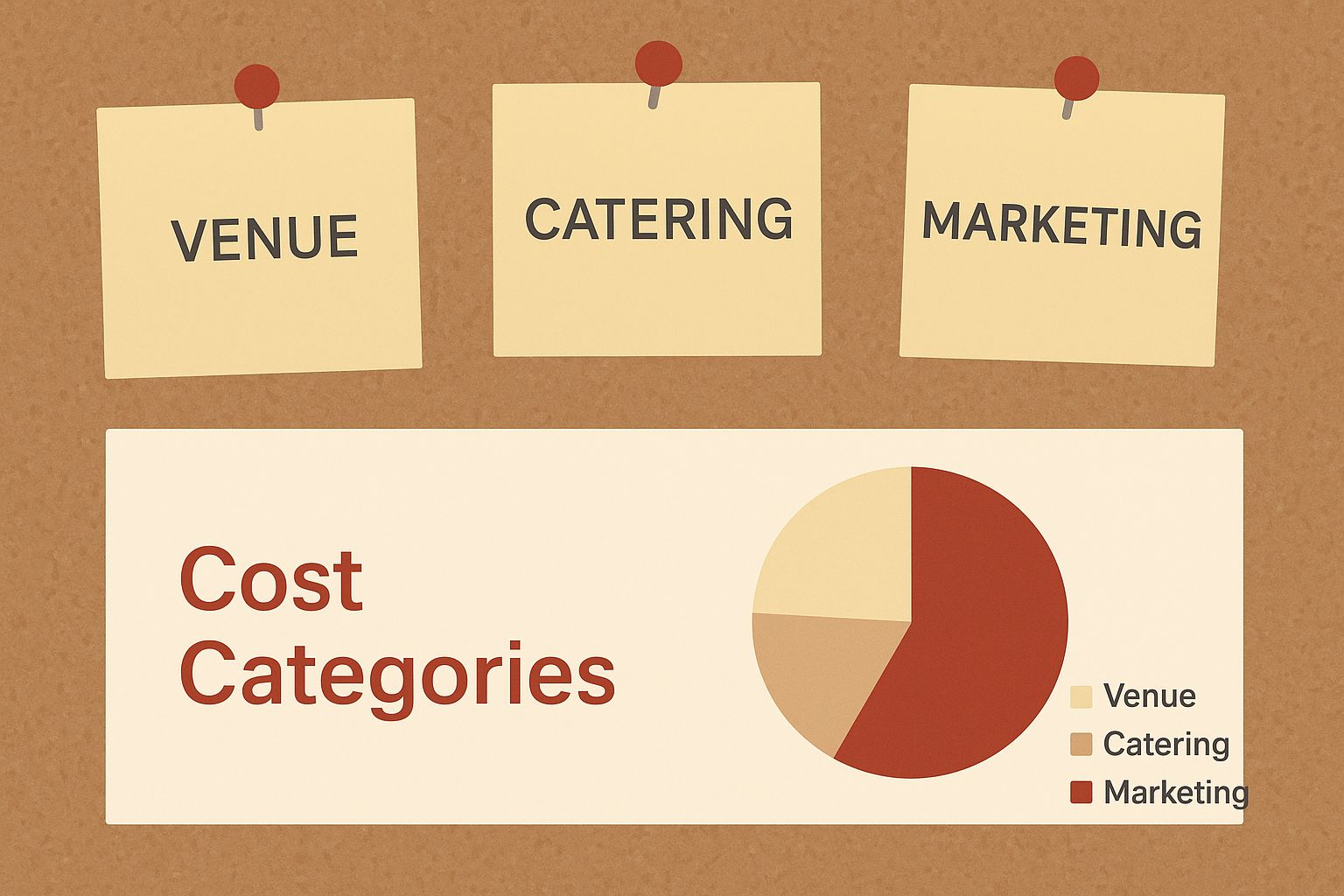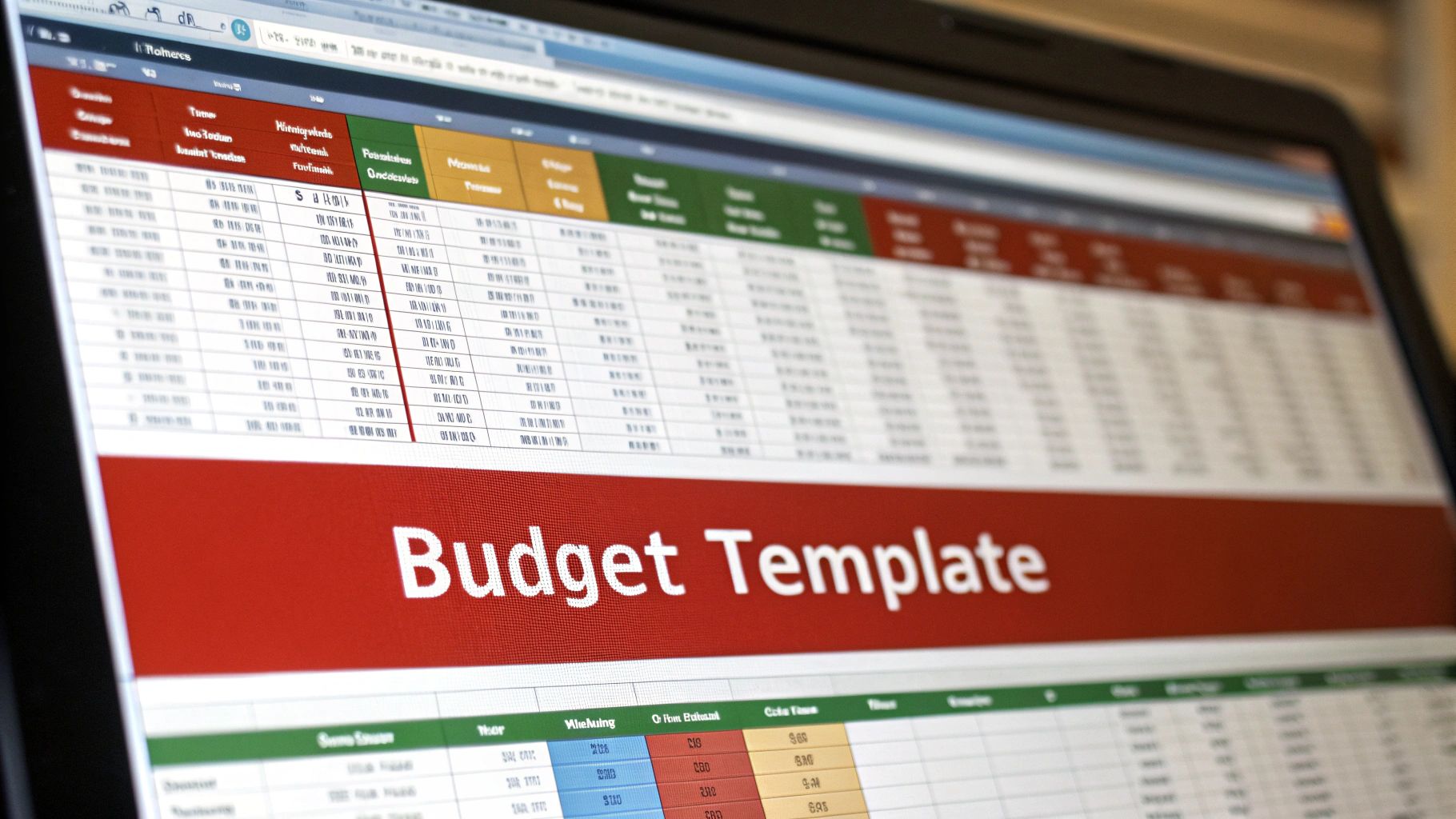Why Generic Budget Templates Fail (And What Actually Works)

Let's be real, most generic event budget templates are practically useless. They might look organized with their rows and columns, but real-world event planning is messy. I've been there: unexpected venue cost increases, caterers bailing last minute, surprise tech expenses… these things can wreck even the most carefully crafted budget. These templates just aren't flexible enough for the constantly changing world of events. Relying on one can set you up for disaster right from the start.
For example, I was once managing a conference, and the AV company initially gave us a decent quote. Then, a week before the event, they hit us with "unforeseen technical requirements" that added thousands of dollars to the bill. If we'd included a buffer and anticipated hidden costs, we wouldn't have been scrambling for funds at the last minute. That taught me a valuable lesson about contingency planning. For more on event strategy, check out this helpful resource: Event Planning for Business: Strategies for Success.
The Importance of Adaptability
Adaptability is essential for a successful event budget. Your template shouldn't be a rigid document; it should be a living tool that changes as your event develops. This means thinking about both expected and unexpected expenses. Budget issues are a huge challenge in event planning, and everyone's being more cautious with money these days. In 2022, a whopping 21% of event organizers were worried about shrinking client budgets. It's a real concern! Discover more insights on event marketing statistics. So, build that flexibility into your budget from the beginning. It helps you handle the unexpected, negotiate better deals, and pull off a great event without going broke. Plus, you can strategically move funds around if necessary, ensuring that key aspects of the event aren't affected by surprise expenses.
Building Your Financial Foundation With Core Categories That Matter
Forget stuffy spreadsheets and complicated formulas. Let's talk real-world event budgeting – the kind that actually works. Think of it like building a house: you need a solid foundation. For your event budget, that foundation consists of these core categories: Venue, Catering, Marketing, Entertainment/Programming, and Contingency (because let's be honest, something always comes up).

This infographic gives you a visual of these core categories. Notice how venue, catering, and marketing are highlighted? They're often the big-ticket items. But these categories aren't just labels – they're your roadmap to understanding where your money is going and where you can tweak things if needed. For example, I once planned a corporate conference where the venue and keynote speakers ate up a huge chunk of the budget, leaving less wiggle room for catering. For a friend's wedding, however, catering and the band were the priorities.
Speaking of templates, a good pro forma can be incredibly helpful. A real estate pro forma, for example, lays out projected income and expenses, and a similar approach works wonders for events. Check out this Real Estate Pro Forma Template for inspiration. It’ll get you thinking about the details.
Understanding Typical Allocation Percentages
Now, here's where things get interesting: allocation percentages. Knowing the typical breakdown for each category is like having a secret weapon. It helps you spot potential overspending before it happens.
For instance, if your venue costs are consistently over 50% of your total budget, it might be time to explore other options. Maybe a slightly smaller space or a different location altogether could free up some much-needed cash. This percentage-based approach helps you quickly identify red flags and make informed decisions.
To give you a better idea, take a look at this table. It breaks down typical allocation percentages for different types of events:
Essential Event Budget Categories and Typical Allocation Percentages
| Category | Corporate Events | Social Events | Nonprofit Events | Typical Range |
|---|---|---|---|---|
| Venue | 30-40% | 20-30% | 15-25% | 15-40% |
| Catering | 20-30% | 30-40% | 10-20% | 10-40% |
| Marketing | 10-15% | 5-10% | 15-20% | 5-20% |
| Entertainment/Programming | 15-20% | 20-30% | 20-30% | 15-30% |
| Contingency | 5-10% | 5-10% | 10-15% | 5-15% |
As you can see, a corporate event might allocate a larger percentage to the venue, while a social event might prioritize catering. Nonprofit events, on the other hand, might allocate a higher percentage to fundraising or programming. Remember, these are just guidelines, but they offer a valuable starting point. Using these benchmarks can help you make smarter choices and ensure your event stays on track financially.
Creating Cost Estimates That Survive Reality
Planning an event budget? I've been there, done that, and let me tell you, those pretty templates can be deceiving. Getting a budget that looks good on paper is one thing, but making sure it aligns with what vendors actually charge is a whole other ball game. I've learned this through countless (and sometimes painful) conversations with venue managers, caterers, and AV pros across different cities. Trust me, generic pricing rarely reflects the reality of your specific event and location.
For example, online venue databases might give you a starting price, but rarely do they include all the extra fees that can sneak up on you. Think service charges, security deposits, even electricity costs – they add up fast! That's why ditching the online research and talking directly to potential vendors is key. Don't be shy about asking detailed pricing questions; it'll save you from some serious sticker shock later. Even attendee costs can make a big difference. I was surprised to learn that 33.7% of event marketers say the average cost to attend a virtual event is between $500 and $1,000. It's important to keep those kinds of stats in mind. Discover more insights on event planning statistics.
Negotiating and Validating For Success
Once you have some initial quotes, don't just take them as gospel. Negotiating is part of the process, and a little friendly back-and-forth can often get you a better deal. Vendors are often willing to work with you, especially if your dates are flexible or you're planning well in advance. But be realistic. If a quote seems way lower than the market average, there’s probably a catch.
Finally, check your estimates against what’s happening in the real world. Talk to other event planners, check industry forums, and go to networking events. Knowing the going rates will give you the confidence to push back on unreasonable quotes and prevent budget surprises. This also means knowing when to accept an offer and when to walk away. It’s a balancing act between sticking to your budget and getting the quality you need. A little homework upfront can save a lot of stress in the long run.
Revenue Planning Beyond Wishful Thinking

Revenue projections. They're the trickiest part of planning your event budget. It's tempting to get swept away by optimistic numbers, but experienced event planners know better. They base their revenue goals on solid data, not just hopes and dreams. Think of it like launching a new product – you wouldn't do it without market research, right? Your event revenue is no different. You need a deep understanding of your target audience, your ticket pricing strategy, and realistic sponsorship potential.
One frequent pitfall is overestimating ticket sales. Sure, those early bird registrations might look promising, but don't be fooled! It's essential to keep an eye on registration trends and adjust your projections based on actual data, not just initial excitement.
Also, explore other ways to bring in revenue besides tickets. Could you offer special workshops, cool merchandise, or VIP experiences? Think about what your attendees would value and how you can create extra income streams. You might even be interested in finding inspiration here: Top 10 Best Conference Giveaways for 2025
Measuring ROI and Managing Expectations
Showing your stakeholders the true value of your event goes beyond just calculating profit. Profit is key, of course, but what about the less tangible benefits, like brand awareness and building relationships? Creating ways to measure these softer outcomes can make a powerful impact when presenting results.
When you're figuring out cost estimates, think about adding AI video ads to your marketing budget. Knowing the cost of AI video ads production can help you create a more accurate budget from the get-go and really show the return on your investment.
Managing sponsor expectations is critical, too. Be upfront about what you can deliver – honesty is the best policy. Focus on creating lasting partnerships that benefit everyone involved. The landscape of event budgets is constantly shifting. Only 38% of event marketers reported budget increases in 2021. That number shifted to 35% in 2022, and then jumped to a whopping 73% in 2023! Find out more about event statistics. This shows just how important accurate revenue planning is when it comes to securing the funds you need. By balancing ambition with realistic financial planning, you’re laying the groundwork for a successful and profitable event.
Surviving Budget Surprises And Unexpected Costs
Let's be honest, every event planner has a budget surprise horror story. One minute you're cruising along, the next, the venue adds a "conveniently forgotten" fee or the speaker decides they need an all-organic, locally sourced rider the size of a small car. I've been there. I once had a caterer try to double their quote two weeks before a major product launch! It felt like the universe was conspiring against me, but we figured it out. These experiences taught me the absolute necessity of flexibility when planning your event budget. You need a financial cushion, something to absorb the shocks.
Building Resilience Into Your Budget
So how do seasoned event planners deal with these unexpected expenses? They build in a contingency fund. This isn't some arbitrary amount; it's a carefully calculated 5-15% of your total budget, set aside specifically for those "oh-no" moments. Even with a contingency fund, tough decisions sometimes have to be made. Prioritizing is crucial. Ask yourself, what absolutely must happen to make this event successful? Focus your budget on protecting those core elements.
For example, during that product launch fiasco with the caterer, the increased cost forced us to scale back on the decor. Not ideal, but a less painful compromise than sacrificing the food quality or skimping on the A/V setup – which would have been a disaster for a product launch!
Communicating Budget Adjustments
Often, the trickiest part isn't making the adjustments, it's communicating them. Transparency and honesty are key. Explain the situation to your stakeholders calmly and rationally. Show them how your updated event budget still delivers value, even with the changes. Trust is everything!
In my experience, offering alternative solutions helps smooth the process. When we broke the news about the catering increase to our client, we presented several revised menus at different price points. This gave them a sense of control and helped maintain our credibility. Maintaining credibility when costs change is everything. It demonstrates resourcefulness and shows you're committed to the event's success, no matter the obstacles.
Let's talk about some common budget surprises and how you can prepare for them. This table outlines some frequent culprits and strategies you can use to mitigate their impact.
| Surprise Cost | Typical Impact | Prevention Strategy | Contingency Option |
|---|---|---|---|
| Venue Fee Increases | Can increase overall budget by 5-10% | Carefully review contracts for hidden fees; negotiate firmly upfront. | Secure backup venue options; negotiate payment plans. |
| Last-Minute Vendor Changes | Can disrupt timelines and increase costs by 10-20% | Have backup vendors lined up; build strong relationships with preferred vendors. | Adjust program elements to accommodate new vendor; renegotiate contracts. |
| Unexpected A/V Needs | Can add 5-15% to the budget. | Conduct a thorough technical assessment of the venue; clearly define A/V requirements in contracts. | Rent equipment from alternative suppliers; simplify production elements. |
| Transportation Delays or Issues | Can impact scheduling and incur additional fees (5-10%). | Build buffer time into travel schedules; have alternative transportation options on standby. | Adjust event schedule to accommodate delays; offer ride-sharing solutions. |
| Catering Changes/Increased Guest Count | Can significantly impact budget (10-20%). | Confirm final guest count early; have a flexible catering contract. | Offer alternative menu options; adjust portion sizes. |
This table isn’t exhaustive, but it highlights some key areas where things can go sideways and offers some proactive strategies. Being prepared and having a plan B (and sometimes C!) is crucial for navigating unexpected budget bumps and ensuring your event stays on track.
Tools And Systems For Ongoing Budget Management
A fantastic event budget template is just the starting point. You also need reliable systems to track your spending, update your projections, and keep everyone informed throughout the planning process. I've learned this the hard way – things can change fast, so having the right tools and a solid workflow is essential. Whether it's a simple spreadsheet or robust event management software, finding the right fit for your event is key.
This screenshot shows how helpful Excel can be for event budget planning. Its flexibility lets you categorize expenses, track actual spending, and easily pull reports. Being able to create formulas and link data between sheets is a game-changer, letting you make dynamic adjustments and analyze your budget efficiently. This makes keeping an eye on your spending and staying within your overall budget so much easier.
Spreadsheet Strategies and Software Solutions
For smaller events, a well-organized spreadsheet can be your secret weapon. Personally, I love using color-coding for different expense categories. Conditional formatting is another great trick for instantly flagging any overspending. And using separate tabs for different budget scenarios? Pure gold. The idea is to make all the information visually clear and digestible at a glance. By the way, you might want to check out this article on Top 10 Tech Corporate Gifts to Impress Clients and Teams – a little something to reward everyone who helped with event planning!
For larger, more complex events, dedicated event management software can be a lifesaver. These platforms offer features like automated payment tracking, real-time reporting, and shared budget access for your entire team. While there's a cost involved, these tools often pay for themselves by streamlining communication and preventing expensive mistakes.
Workflow Tips for Budget Sanity
Staying on top of your budget shouldn't mean being glued to your computer 24/7. I find that scheduling weekly budget review sessions is super helpful. Delegating expense tracking to specific team members also takes a load off. And automating expense reports wherever possible? Brilliant! This approach lets you spot potential issues early on, make necessary adjustments, and keep stakeholders informed without having to constantly micromanage. The key is to maintain control of your finances without sacrificing valuable planning time. Remember, your budget should be a helpful tool, not a source of stress!
Your Budget Success Implementation Plan
So, we've talked budget basics. Now, how do you actually use all this info for your next event? Forget rigid rules. Think of this more as a flexible roadmap that bends to fit your specific event. Your event budget planning template? It's a living document, not some dusty spreadsheet.
Adapting Your Template
Every event is unique. A corporate conference in a big city is a whole different animal than a small fundraising gala in a local restaurant. Your template needs to reflect that. Planning a virtual event? Venue costs might be low, but tech expenses will probably be higher. Tweak those categories and allocation percentages to match your reality. Need some inspiration? Check out this Event Marketing Strategy Template: Boost Your Event Success.
Validating and Testing
Don’t just pull numbers out of thin air. Call vendors, get real quotes, and make sure your assumptions match up with what's actually happening in the market. Remember my AV nightmare story? Validating costs upfront saves you from major headaches (and budget blowouts) later. A simple checklist can be a lifesaver. Think: comparing vendor quotes, researching industry averages, and even checking for seasonal price changes. Testing your estimates with real-world data keeps your budget grounded in reality.
Measuring Success
How do you know if your budget planning is actually working? Set clear benchmarks. Maybe that's staying under your total budget, hitting sponsorship targets, or reaching a specific ROI. Don’t just set it and forget it. Track your progress throughout the entire planning process. Regular check-ins let you adjust as needed and stay on track. Consistent monitoring and adjustment are the keys to effective budget management.
Building Your Budget Planning Skills
Every event, successful or not, is a learning experience. Afterward, take some time to reflect. What went smoothly? What could have been better? Was your contingency fund too small? Did you underestimate marketing costs? Use these lessons to refine your template and sharpen your budgeting skills. The more events you plan, the better you’ll get at anticipating those unexpected challenges, negotiating with vendors, and managing your resources effectively.



